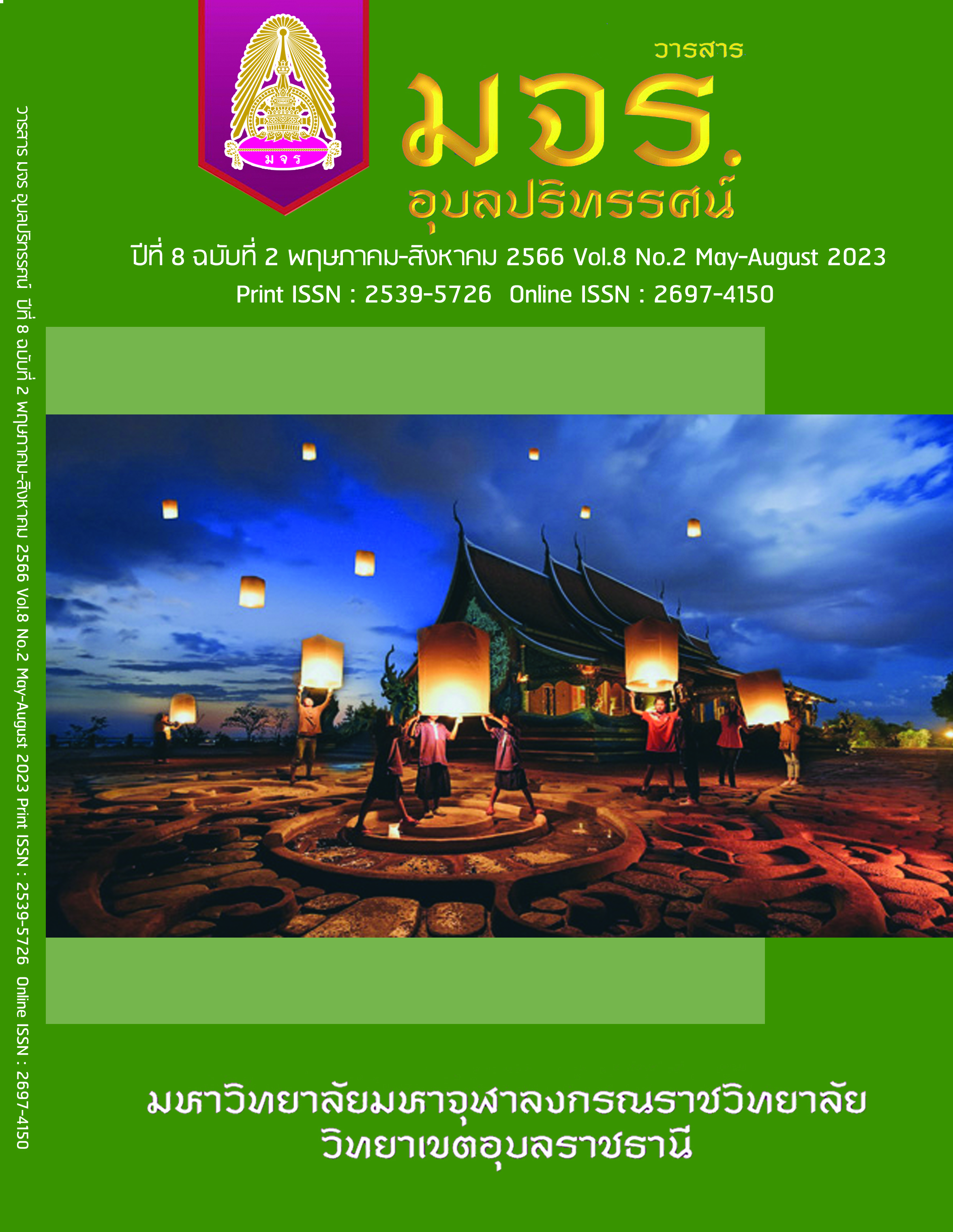The Development of Argumentative Abilities Using Argumentative Activities of High School Students.
Main Article Content
Abstract
The purposes of this research were to 1) develop the argumentative activities of high school students, 2) develop the argumentative ability of high school students. The sample group were 8 high school students of Suankularb Wittayalai Thonburi School, Bang Khun Thian District, Bangkok in the second semester of the academic year 2022, were obtained by voluntary selection which is a group of students who were selected to represent students in debate competitions who are interested in developing the argumentative ability. The research tools were argumentative activity plan assessment forms and a questionnaire on students' opinions on argumentation activities. The data were analyzed using descriptive statistics, namely frequency and percentage
The research results showed that 1) Argumentation activities of high school students were deductive argumentation, inductive argumentation, analogical argumentation and debating, all together 4 activities. 2) All plans are of the highest and high level of quality. 3) In the deductive argumentation activity, there were
2 samples of students who had important characteristics of argumentative ability and argumentative ability. In the inductive argumentation activity, there were
6 samples of students who had important characteristics of argumentative ability and argumentative ability. In the analogical argumentation activity, there were
4 samples of students who had important characteristics of argumentation ability, but all the sample students had argumentative ability. And in the debating activity, there were 7 students in the sample group who had important characteristics of argumentative ability and argumentative ability. 4) All students had the opinion on argumentation activities at the highest level in all items, except for the assessment of various activities that agreed at the highest level equal to the high level.
Article Details
References
กุลชญา พิบูลย์. 2561. “ผลของการเรียนการสอนด้วยรูปแบบการสร้างข้อโต้แย้งโดยใช้แผนผัง
ออนไลน์ร่วมกับแท็กคลาวด์ที่มีต่อความสามารถในการให้เหตุผลทางวิทยาศาสตร์ของ
ผู้เรียนมัธยมศึกษาตอนปลาย”. วิทยานิพนธ์ครุศาสตรมหาบัณฑิต.
สาขาเทคโนโลยีและสื่อสารการศึกษา: จุฬาลงกรณ์มหาวิทยาลัย.
ชยพร กระต่ายทอง. 2552. “การพัฒนารายวิชาเพิ่มเติมภาษาไทยแบบอิงมาตรฐานด้วย
กระบวนการออกแบบย้อนกลับเพื่อเสริมสร้างความสามารถการวิเคราะห์และการอ่านเชิงวิเคราะห์ของนักเรียนมัธยมศึกษาตอนต้น”. วิทยานิพนธ์ครุศาสตรดุษฎีบัณฑิต.
สาขาหลักสูตรและการสอน: จุฬาลงกรณ์มหาวิทยาลัย.
นะฤเนตร จุฬากาญจน์. 2556. “ผลของโปรแกรมพัฒนาความฉลาดทางอารมณ์โดยประยุกต์
หลักการคิดแบบพุทธธรรม (โยนิโสมนสิการ) สำหรับนักเรียนมัธยมศึกษาตอนปลาย”.
วิทยานิพนธ์วิทยาศาสตรมหาบัณฑิต. สาขาสาธารณสุขศาสตร์: มหาวิทยาลัยมหิดล.
พิมพันธ์ เดชะคุปต์ และพเยาว์ ยินดีสุข. 2558. การจัดการเรียนรู้ในศตวรรษที่ 21.
พิมพ์ครั้งที่ 2. กรุงเทพมหานคร: โรงพิมพ์แห่งจุฬาลงกรณ์มหาวิทยาลัย.
ภคพร อิสระ. 2557. “ผลของการใช้รูปแบบการจัดการเรียนรู้สืบสอบแบบมีการโต้แย้งร่วมกับ
เทคนิคการเรียนรู้แบบร่วมมือที่มีต่อผลสัมฤทธิ์ทางการเรียนเคมีและความสามารถใน
การให้เหตุผลเชิงวิทยาศาสตร์ของผู้เรียนมัธยมศึกษาตอนปลายโรงเรียนวิทยาศาสตร์
ภูมิภาค”. วิทยานิพนธ์ครุศาสตรมหาบัณฑิต. สาขาการศึกษาวิทยาศาสตร์:
จุฬาลงกรณ์มหาวิทยาลัย.
ภาวิณี รัตนคอน. 2561. “การพัฒนาเกณฑ์การประเมินทักษะการโต้แย้งโดยใช้ประเด็นทางสังคมที่เกี่ยวข้องกับวิทยาศาสตร์ สำหรับนักเรียนชั้นมัธยมศึกษาปีที่ 3”
วารสารอิเล็กทรอนิกส์ Veridian มหาวิทยาลัยศิลปากร. ปีที่ 11 ฉบับที่ 2 (พฤษภาคม-สิงหาคม 2561): 2720-2735.
วนิดา พรมเขต. 2565. “ศึกษาความสามารถในการโต้วาทีด้วยการเรียนออนไลน์ร่วมกับ
การจัดการเรียนการสอนโดยเน้นกระบวนการเรียนรู้ด้วยตนเองของนักศึกษาชั้นปีที่ 1 มหาวิทยาลัยราชภัฏอุดรธานี” วารสารมนุษยศาสตร์และสังคมศาสตร์
มหาวิทยาลัยราชภัฏอุดรธานี. ปีที่ 11 ฉบับที่ 1 (มกราคม-มิถุนายน 2565): 37-54.
วรัญญา จำปามูล. 2555. “ผลของการใช้รูปแบบการจัดการเรียนรู้การสร้างข้อโต้แย้งที่มีต่อ
ผลสัมฤทธิ์ทางการเรียนรู้วิทยาศาสตร์และความสามารถการคิดเชิงเหตุผลของนักเรียนมัธยมศึกษาตอนต้น”. วิทยานิพนธ์ครุศาสตรมหาบัณฑิต. สาขาการศึกษาวิทยาศาสตร์:
จุฬาลงกรณ์มหาวิทยาลัย.
สถานีวิทยุกระจายเสียงแห่งจุฬาลงกรณ์มหาวิทยาลัย. 2559. การโต้แย้ง [ออนไลน์].
https://curadio.chula.ac.th/Images/Class-Onair/th/2016/th-2016-10-27.pdf,
มกราคม 2565.
สำนักงานคณะกรรมการการศึกษาขั้นพื้นฐาน. 2555. หนังสือเรียน รายวิชาพื้นฐาน ภาษาไทย
หลักภาษาและการใช้ภาษาเพื่อการสื่อสาร ชั้นมัธยมศึกษาปีที่ 6. กรุงเทพมหานคร:
โรงพิมพ์ สกสค. ลาดพร้าว.
สำอาง หิรัญบูรณะ, ปราณี บุญคลัง, ดวงตา ตาฬวัฒน์, และ โสภณ นิไชยโยค. 2546.
การประเมินพัฒนาการสำหรับนักเรียนที่มีความสามารถพิเศษด้านภาษาไทย
ระดับมัธยมศึกษาตอนปลาย. กรุงเทพมหานคร: สกศ.
Macagno, F. 2015. “A Means-End Classification of Argumentation Schemes.” in
Reflections on Theoretical Issues in Argumentation Theory (August 2015): 183-201.
Nickerson, R., 2020. Argumentation The Art of Persuasion [Online].
https://www.cambridge.org/core/books/argumentation/types-of-argument/4835610C45D0802FC22AA3AFF533CA77, January 6, 2022.
Novaes, C. D. 2021. Argument and Argumentation [Online].
https://plato.stanford.edu/entries/argument/#Conc, January 6, 2022.
Sampson, V. and F. Gerbino. 2010. “Two Instructional Models That Teachers Can
Use to Promote & Support Scientific Argumentation in the Biology Classroom.” The America Biology Teacher 12(7): 427-431.

